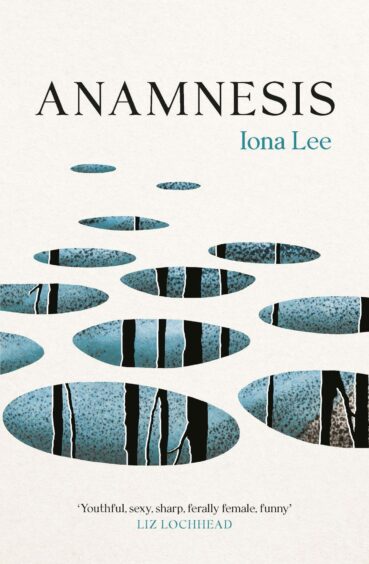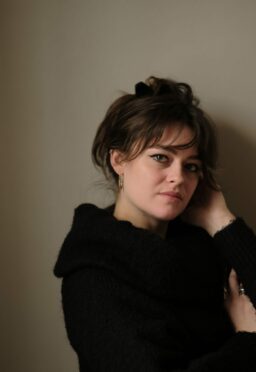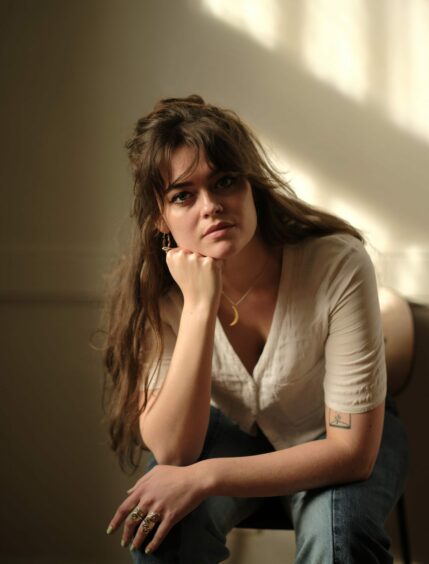For creative polymath Iona Lee, the journey to publishing her first book of poems took longer than expected but she is more than happy that it worked out that way.
Iona (27) recently completed a masters degree at Duncan of Jordanstone in Dundee, having studied illustration at Glasgow School of Art. The poet, artist, spoken word performer and music maker says: “It had always been sort of a bit of a toss up for me about whether I wanted to go to art school or go to university and I found out that they do these really good courses at Dundee, that sort of merge the academic with the creative.

Anamnesis by Iona Lee. Supplied by Birlinn Ltd.Having gained a First Class MFA in Art and Philosophy, she thinks, “the plan is to do a PhD in the same course at some point in the next few years.”
As she chats from her home in Leith, Iona tells me that the early years of her childhood were spent following her parents who are both professional actors. “We settled in East Lothian for my schooling and stuff,” she says, “but there was a lot of travelling around and the green room was my babysitter. I’d just be handed a bunch of colouring pens and sort of left to it.
“I’d overhear the play on the Tannoy,” she recalls, “and a characters from the 18th century would wander in to have their cigarette break then go back on stage.”
Creative encouragement
Far from resenting her unusual upbringing, the writer says, “I loved it, it wouldn’t have had it any other way. I was really proud of the fact that that was what they did.”
Iona was an only child and I wonder whether that’s also where some of her creativity stems from? “When you’re an only child you get good at being by yourself and playing on your own, bringing out ways of entertaining yourself,” she says. “And that often involves drawing, writing stories with little shows and whatever.
“I definitely wrote a lot as a child, but mainly stories, which is weird – I never write stories anymore. When I was a kid I was blessed with parents who, you know were invested in my inner creative word and could join in. They were the kind of parents who would listen to the stories or watch your little plays.”
School years for Iona
When it was time for Iona to go to high school, the family settled in Haddington but she didn’t love her school experience. “I didn’t really like my time at school very much. I was always trying to make my parents put be in a different school or home-school me,” she remembers.
She’s pragmatic about it though, “I found it hard to relate to kids my age, honestly, I’ve been socialised around adults, I’m an an old soul. It’s like in a big well, you’re just throwing in all these kids from all these different backgrounds and they have to figure out how to connect with one another.”
The academic side was where Iona did feel more at home. “I found solace in books and the art department and all the classics – the sort of slightly nerdy misunderstood pursuits,” she laughs.
First taste of poetry
“Like a lot of slightly nerdy, slightly creative kids at school, there was ‘an English teacher’, who I think spotted that I was sort of sat there looking a bit frustrated and a bit lost.” The teacher gave her additional work and introduced her to a specific poem. “It was an odd choice in many ways because it was by a writer who’s not really thought of as much as a poet. Mark Haddon, who wrote The Curious Incident of the Dog in the Night Time.”
“So my dad is very learned about poetry and I think in many ways he got into theatre because of a love of language (and also he was probably unemployed at the time and bored!) So he got really into like, ‘let’s explore this poem!’
“That was the first time I’d ever really approached poetry properly and knew what it was about and I guess from there I then studied Yates in sixth year. I kind of figured it out – that what I loved most about writing was playing with words themselves and I think poetry is the style of writing in which that’s the most at the forefront.”
She believes that poetry also allows her to express herself visually, “it’s image setting: it’s illustration and it’s philosophical and those are all things that I’m into.
“And then your brain shifts, you know? When you write stories, you’re always thinking of stories, but then when you write poetry it’s more thinking of ideas and aesthetics, scene setting and just concepts that you’re trying to work with rather than having a story to tell.”
Poetry can be intimidating
For Iona, poetry is “like music in that it’s also what’s in the unsaid, it’s in the white space and the pauses and the breath and also how you approach a poem.”
She admits that the artform can be: “intimidating because there is an element of it that is very stuffy and expensive and, um, up its own arse, basically, and isn’t welcoming.
“It doesn’t want to let you in. It’s a secret club for smart people, but I’m not interested in that kind of poetry.”
She says that her real first relationship with language was the spoken word. “Writing words in order to be heard rather than seen, is the music of language and rhythm and breath and tone, timbre and all that stuff.
“Basically learning works in order to perform then and read them out loud, was my first way in. It was all spoken word poetry for the first five or six years. I’ve only recently got into page poetry, to any extent.
Spoken word poetry
The once thriving spoken word poetry scene in Scotland has seen a real downturn in recent years, however and Iona says that there have been fewer gigs available recently. “A lot of big nights ended at all at the same time, but there was also the pandemic, the cost of living adding to it.
“There’s only one professional night which has funding in Scotland right now. This year I didn’t actually do a single poetry gig till May. There was a point when you could be doing four gigs a week, easy.
She was approached to write a book, she says, because there was an appetite for work from a younger poet. “This was when I was 20, and I was like of course, a book, I could write one next week!
“But there is a set way of doing things in the page poetry world. Tradition. You do a pamphlet first and then the idea was that when you feel ready to do a book, we’ll publish it.”
Anamnesis
As her twenties progress, she feels that, “I got less naïve and I got better. But in the process of getting better I also became more aware of my inadequacy and what I didn’t know and what I needed to learn. It took me five years longer than I thought it would. But that was the right thing.”
And so Iona’s first poetry collection Anamnesis is arriving in bookshops across the country. Why did she choose the title?
“So when I say that I lead with language first. I mean, I’m constantly collecting new words,” she says. “I just really like words as objects – as beautiful trinkets or something, you know, even detached from their meaning.
“I especially like nice sounding words that have interesting meanings. Now Anamnesis, is a risky title:. It’s potentially a bit wanky it is from Greek, so that’s sort of a statement and people don’t really know how to pronounce it, and also certainly people don’t know what it means.
“But I like introducing people to new, interesting words,” she enthuses. It means memories of a past life. And I just think that’s really interesting concept. It comes from philosophy and philosophy is one of my favourite things. Within philosophy, it’s basically the idea that perhaps we are born with all knowledge which we lose, and then we have to spend the rest of our life remembering it or regaining it.”
Praise for Anamnesis
The term brings in concepts such as deja vu, or simply having a connection or an unexplained insight into something. “I’m interested in that as an idea,” says Iona, “and I think it links to poetry a lot, because with poetry, you’re essentially trying to bottle that.”
If the tributes from fellow writers are anything to go by, Iona has done just that with Anamnesis. Liz Lochhead has hailed the collection as, “Youthful, sexy, sharp, ferally female and funny.” Praise also comes from rapper and spoken word poet, Darren McGarvey, who Iona points out, “I beat him in a slam when I was 19!” He’s all about language as well you know. We’ve done gigs together over the years and he’s always been really encouraging.”
Anamnesis is available now, published by Polygon, £10.

